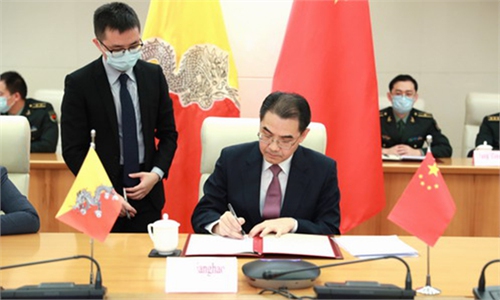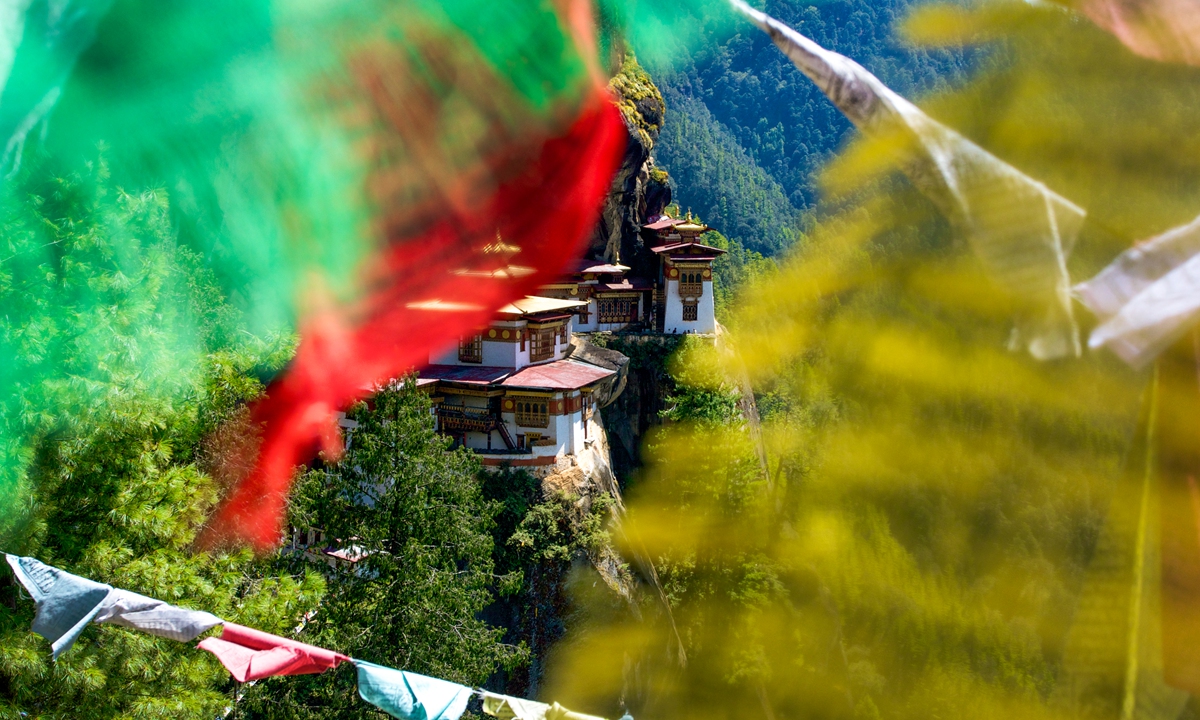
A view of Taktsang Palphug Monastery, the holiest Buddhist temple and a landmark in Bhutan. Photo: IC
After China and Bhutan signed a memorandum of understanding (MoU) on a Three-step Roadmap for expediting border negotiations, the move was hailed by Chinese experts as a historical milestone that broke the current deadlock caused by India and laid the foundations for future engagement and even the establishment of diplomatic relations between China and Bhutan.
The Global Times tried to contact several Bhutanese citizens to hear their views on the future of the two countries' relations but was declined politely. A Chinese-Nepalese contact who has lived in several South Asian countries pointed out a possible reason behind the rejection is that they may be fear that India might hear their true opinion, causing rouble for them.
So, what are they afraid of Experts on border studies said that some people in Bhutan feel that India's "embrace" is becoming "suffocating and controlling" as Bhutan's national defense, energy and economy are tightly under their neighbor's grasp.
Bhutan's Prime Minister Lotay Tshering, who came to power in 2018, has a different agenda compared with the previous government. Before, Bhutan looked for a closer relationship with India and requested its aid, but Tshering began to focus more on independent development. Along with China's enhanced efforts in safeguarding the Doklam area, the possibility for India to stir up trouble in the area has been greatly reduced.
Whether Bhutan and China could yield any results on the border negotiations, there needs to be a full-scale improvement in China-India relations, Zhang Jiadong, professor at the Center for American Studies of Fudan University, told the Global Times, adding that now, there should not be an over optimistic view on the progress in China-Bhutan relations considering the numerous challenges that lay ahead.
Hold tight
The last time the Global Times contacted Kelly, a merchant from Bhutan, was a year ago when he rushed to promote his handmade Thangka, a traditional Buddhist painting, hoping that his products could be sold in China after being unemployed for nearly 10 months due to the COVID-19 pandemic.
In 2018, he established an international travel agency as he is fluent in Chinese. Not long ago, in 2017, there were only about 15 licensed tour guides who could speak Chinese in Bhutan.
Official statistics show that in 2015 about 10,000 Chinese tourists traveled to Bhutan, exceeding the number of American travelers. China became Bhutan's most important source of international tourists.
On March 5, 2020, the Bhutanese government announced that foreign tourists would be banned from entering the country, starting March 6, 2020, because of the epidemic which completely cut off the livelihood of Bhutanese like Kelly who wanted to make a career in tourism.
"Tourism has come to a halt across South Asia," said Jin Xiaodong, chairman of the Association of Overseas Chinese in Nepal. Jin has been involved in the tourism industry in South Asia for 16 years. His business covers India, Bhutan, Bangladesh, Sri Lanka and Nepal, and he has been to Bhutan many times. Tourism is one of Bhutan's few economic pillars not yet controlled by India.
India's control of Bhutan is comprehensive. For instance, in national defense, the Bhutanese army has many members from India. The border patrol forces are sometimes Indian troops.
Many Bhutanese officials have studied in India, Zhang said, adding that it is the same situation as in the diplomatic sector. So far, Bhutan has established diplomatic ties with dozens of countries but not with any of the permanent member of the United Nation Security Council.
"The main reason is that India holds tightly onto Bhutan. If Bhutan establishes diplomatic ties with these major powers, it will completely change the situation," Zhang said, noting that as the establishment of diplomatic ties with permanent members of the Security Council represents an additional security commitment, India then would not be able to completely control or eventually annex Bhutan.
"That is not what India wants to see," Zhang said.
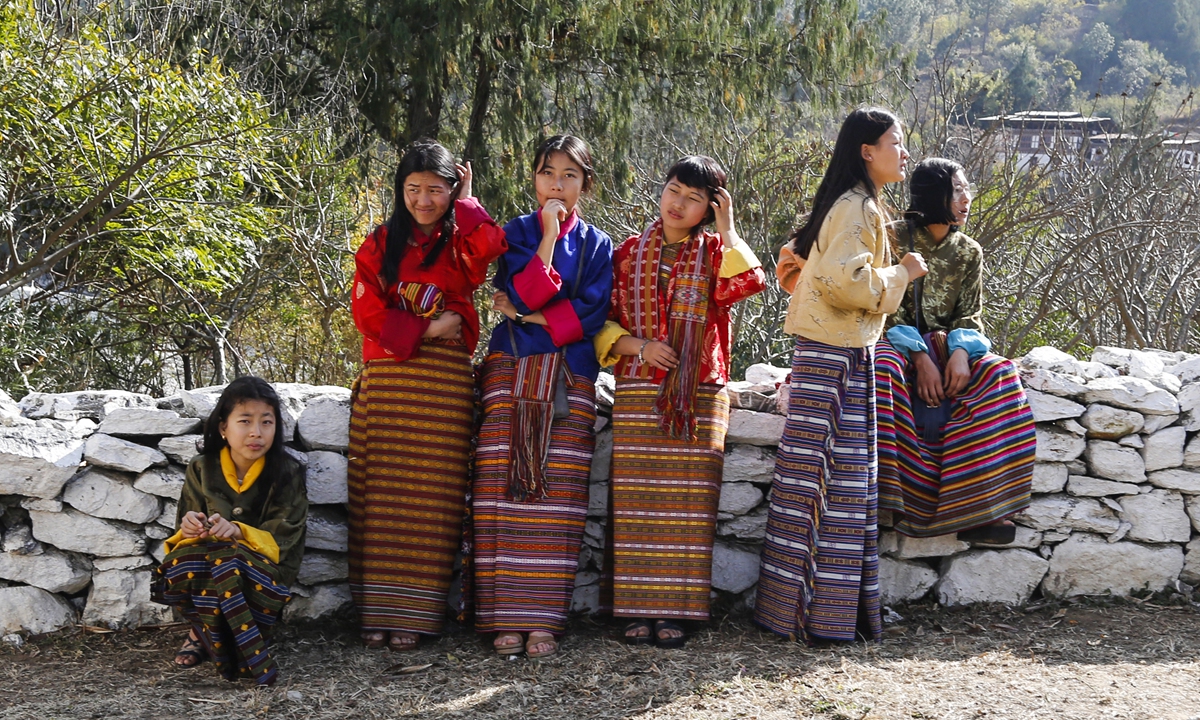
Bhutanese girls chat in Punakha on February 16, 2019. Photo: VCG
Meanwhile, Bhutan's economy has been strictly controlled by India, Zhang Yongpan, a research fellow of the Institute of Chinese Borderland Studies of the Chinese Academy of Social Science, told the Global Times.
India remains Bhutan's largest trading partner and its main exports to Bhutan include mineral products, machinery, electrical equipment, base metals, vehicles, vegetable products and plastics. On the other hand, Bhutan mainly exports electricity, iron silicon, silicate cement, dolomite, wood and wood products, potatoes, cardamom and fruit products, among others, to India. Also, India controls its energy sector, according to Zhang.
Bhutan is very rich in hydropower resources. India and Bhutan have close cooperation in power development and much of Bhutan's financial revenue also comes from power exports.
For instance, for the well-known Chukha Hydroelectric Project India provided 60 percent of the funds while the rest 40 percent came from loans. The project became a stable source of income for Bhutan when it was completed in 1988.
In fact, a steady income, when it comes to critical moments, becomes a key factor in the decision-making process. In the second national election in Bhutan's history held on July 13, 2013, the opposition People's Democratic Party (PDP) unexpectedly defeated the ruling Prosperity and Progressive Party (PPP). But surprisingly, just a month and a half ago during the first round of elections, the PPP was in the leading position. Just at the end of June, before the elections, India announced that it would cease to subsidize household gas and diesel and would cancel price subsidies for electricity imported from the Chukha hydroelectric power station, effectively doubling domestic fuel prices in Bhutan.
Such move also triggered the public's anger as it is a threat to the security of Bhutan's fiscal revenues and expenditures, which also became the main issues in the second round of elections for the National Assembly. The PDP took the opportunity to accuse the PPP of destroying relations with India by ignoring people's livelihood.
Zhang said Bhutan has mainly a partisan system but all political parties in the country could be seen as pro-India, while there are some differences.
"The distinction is that some political parties think that Bhutan stands with India, and there is no problem with them listening to India. However, there are some politicians in the country considering that, although the country has close relations with India, Bhutan is a sovereign state that needs to be independent and develop relations with major powers like China." he said.
Changes happening
Bhutanese people have a very friendly approach toward China. In this respect, Jin said the Bhutanese have a good impression of China and they know its development. Many also want to go to China to learn the language because, before the epidemic, the number of Chinese tourists to Bhutan had increased. If there is an Indian tour group and a Chinese tour group, Bhutanese operators would definitely prefer to receive Chinese tourists because they have much higher spending power than South Asian tourists and are more civilized than Indian visitors.
According to Jin, Bhutanese also like Chinese products. Mobile phone brands like VIVO and OPPO are very popular locally. However, as there are no diplomatic ties between China and Bhutan, it is very difficult for China's products to enter the country. Jin mentioned that "a product usually needs to enter Bhutan through India and there are many problems. For example, India imposes high taxes. The prices of Chinese products are low but when they enter Bhutan, it could increase by even 10 times.
"Bhutanese people are uncomfortable with many of India's practices but they have no way to speak out because Bhutan is so weak," Jin said.
After the Doklam standoff in 2017, Bhutan's attitude toward China and India start to change.
"India's infiltration into Bhutan is very strong. It would be impossible for India not to know about such a major progress [the MoU] and it is also unreal for Bhutan to hide from India or even challenge it," Zhang Jiadong said, noting that, "although India could control and interfere with Bhutan, Bhutan is an independent country and India does not want to be seen as a bully in the world."
The Hindustan Times reported that the spokesperson of the Indian Foreign Ministry did not comment on whether Bhutan had kept India informed on the MoU.
In fact, changes are already happening quietly in Bhutan. Zhang Yongpan said, noting that in 2007, Bhutan and India signed a newly revised India-Bhutan Friendship Treaty which is actually an upgraded version of the 1949 treaty. But from the perspective of this agreement, India became a close partner and friend to Bhutan. Although full equality has still not been achieved, Bhutan is working toward it.
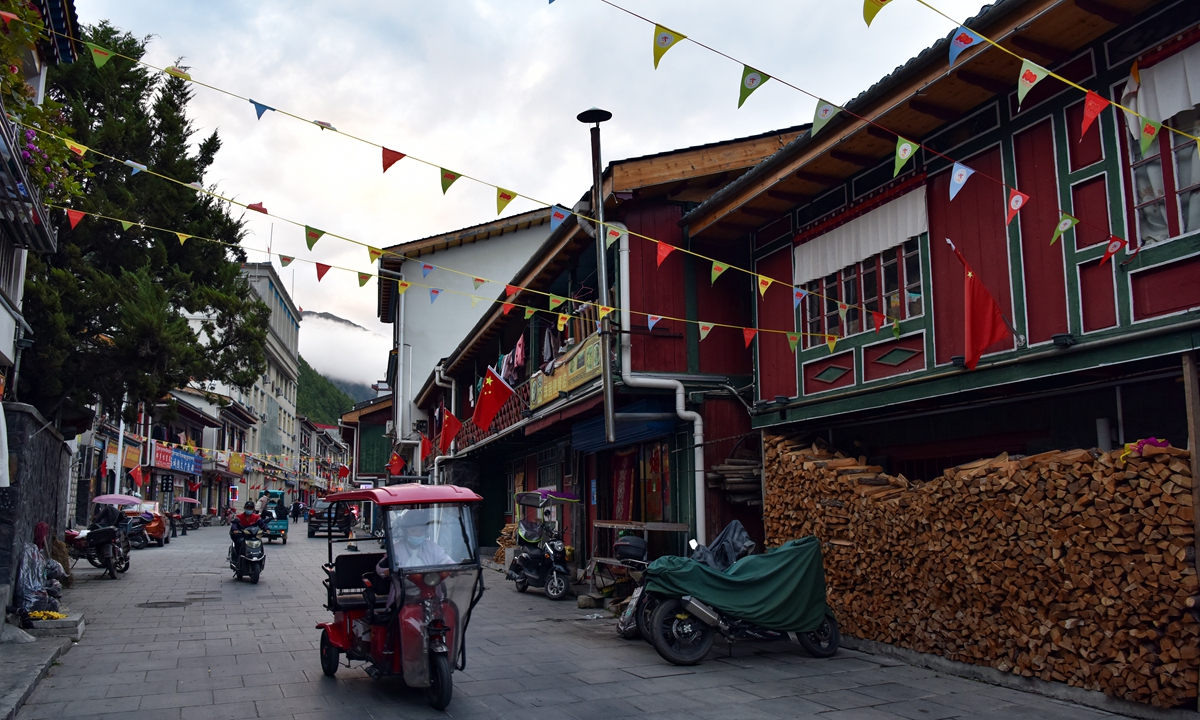
A village in Yadong county in China's Xizang Autonomous Region borders India and Bhutan. Photo: IC
Since the Doklam standoff, Bhutan's economy has been slowly growing with many locals believing that their country was suffering from a backward economy because of the long-term control by India. Local residents tend to lean toward China and the Chinese government as they have provided more education and economic opportunities to young people in Bhutan, which has exacerbated India's jealousy, according to Zhang Yongpan.
Since the outbreak of the epidemic, India's economy and people's livelihood have suffered numerous setbacks and its assistance to Bhutan has also weakened significantly. "At the moment, if India is going to continue to have a close relationship with Bhutan, it will have to devote more 'energy' to taking care of Bhutan or accede to Bhutan's demands," Zhang said.
China's help
"Since 1984, China and Bhutan have been in border negotiations with relatively smooth progress. Before the epidemic, China and Bhutan had completed 24 rounds of border negotiations, the last of which was held in 2016. Since the outbreak of COVID-19 in 2019, normal border negotiations between the two countries have not completely stopped," Zhang said, highlighting that "the signing of the MoU plays an important role in developing bilateral relations and stabilizing the border areas between China and Bhutan. The Three-step Roadmap is an important continuation of previous negotiations and strongly pushes forward the process of China-Bhutan border negotiations."
"The diplomatic independence that some Bhutanese politicians are talking about is not to get rid of India's control but to use that independence as a means to guarantee national security. This is most important because Bhutan does not have the ability to guarantee its own security by force, but only by international visibility and the legitimacy of international law," Zhang Jiadong said.
Therefore, he believes Bhutan is not against India but tries to tolerate it for survival.
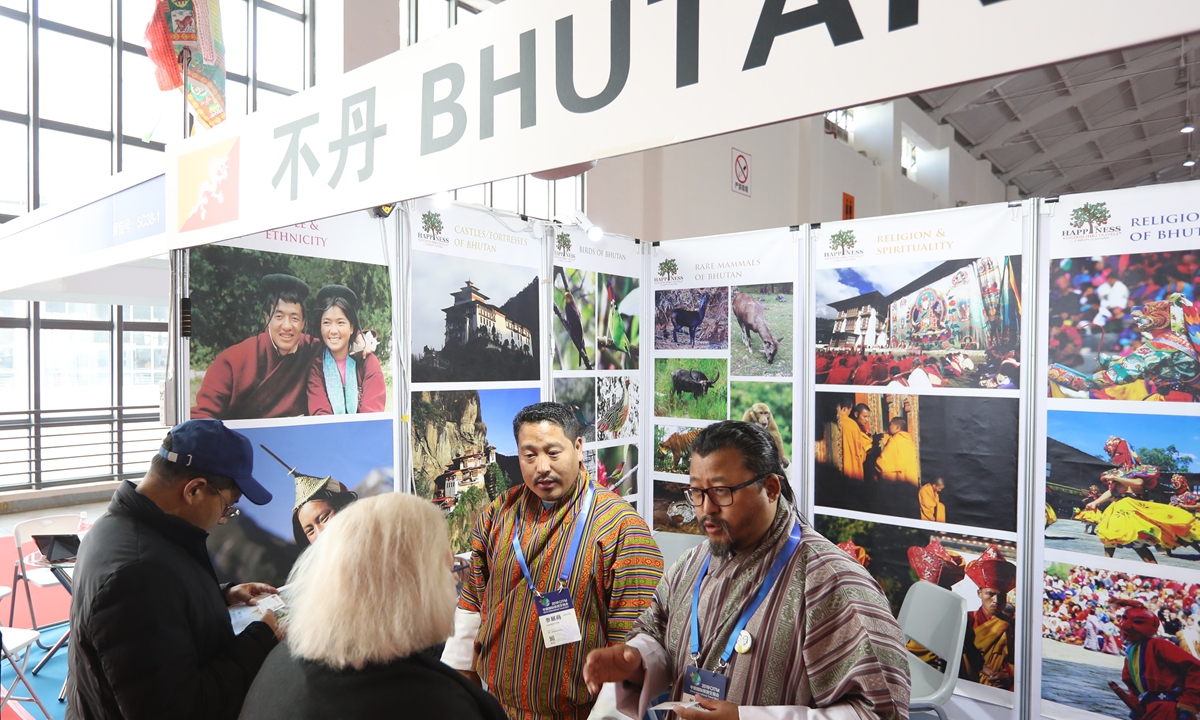
Visitors make inquiries at the Bhutan stand at the China International Travel Mart in Kunming, Southwest China's Yunnan Province, on November 15, 2019. Photo: VCG
"The former Sikkim, as an independent country, made itself dependent on India. The country was finally swallowed by India. Bhutan has learned a lesson from it," Zhang said.
Jin Xiaodong said that many of his Bhutanese friends hope that the epidemic will be over soon and expect to establish diplomatic ties with China.
Zhang Yongpan said that Bhutan has always attached great importance to the energy sector and it is a priority on Bhutan's five-year plan. If China establishes diplomatic relations with Bhutan, it could quickly contribute to the diversification of Bhutan's industries as well as to the rapid improvement and growth of Bhutan's hydropower installation which has remained largely flat in recent years.
However, Zhang Jiadong warned not to be too optimistic about these prospects as India still plays a big part in the situation. "Bhutan and China were separated by the Himalayas. The border negotiations between both sides depend on a comprehensive improvement of the China-India relations."
